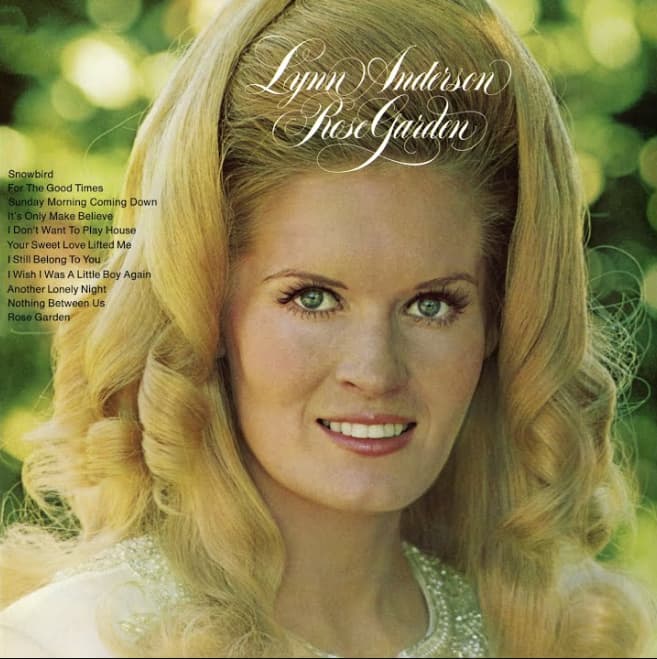
A Bouquet of Sunshine and Reality: The Enduring Legacy of “Rose Garden”
The song is a candid reminder that love, like life, will always have its share of rain alongside the sunshine. 🌧️☀️
There are just some songs that instantly transport you back in time, and for many of us, the opening notes of Lynn Anderson‘s signature hit, “(I Never Promised You a) Rose Garden”, evoke the golden, slightly melancholy hue of the early 1970s. Released in October 1970, this monumental recording—the title track of her 1970 album, Rose Garden—was not just a country hit; it was a global phenomenon that irrevocably changed the landscape of country music, forging a path for the “crossover” artists that followed.
Rose Garden was an indisputable chartbuster, a rare track that blossomed across multiple genres. On the US Billboard Hot Country Singles chart, the song became Lynn Anderson‘s first chart-topper, holding the coveted Number 1 spot for five weeks. Its reach, however, extended far beyond Nashville. It peaked at an impressive Number 3 on the all-genre US Billboard Hot 100 pop chart and also reached Number 1 in multiple other countries, including Canada, Australia, and New Zealand, cementing its status as one of the most successful country crossover songs of all time. This phenomenal success earned Anderson a Grammy Award for Best Female Country Vocal Performance. The accompanying album, Rose Garden, also topped the Country Albums chart for a stunning 14 weeks and reached a career-high of Number 19 on the all-genre Billboard 200 album chart.
The Story Behind the Song
The journey of “Rose Garden” to becoming Lynn Anderson‘s career-defining anthem is a fascinating tale of artistic conviction triumphing over resistance. The song was originally written by the great Joe South in 1968, and prior to Anderson‘s version, it had already been recorded by a few male artists, including South himself. When Anderson brought the idea of recording it to her producer and then-husband, Glenn Sutton, he initially scoffed at the idea. His main objection centered on the lyrics, specifically lines like, “I could promise you things like big diamond rings…”, which he felt sounded ridiculous coming from a woman. It was a classic “man’s song,” in his estimation.
But Lynn Anderson was resolute. She saw the core message and knew her interpretation could transform it. Her insistence led to the song being recorded almost as an afterthought, in a spare fifteen minutes at the end of a session. The musicians gave it a distinctive, slightly unusual ‘shuffle rhythm’ for country music, which Sutton, sensing the potential, later augmented with lush strings, leading to the polished, “Countrypolitan” sound that defined its crossover appeal. Columbia Records executive Clive Davis immediately recognized its potential and pushed it as a single, and the rest is history. Anderson took a song meant for a man and infused it with a woman’s strength and practical insight, giving the world a new, powerful voice.
The Enduring Meaning
At its heart, “Rose Garden” is a masterclass in straightforward, mature realism regarding relationships. The central lyric, “I beg your pardon / I never promised you a rose garden”, is more than just a catchy hook; it’s a profound statement of acceptance and resilience. The ‘rose garden’ is a metaphor for a perfect, effortless life or relationship—a fantasy that the singer is quick to dismantle.
The song’s message is simple yet timeless: life and love are full of ups and downs. Along with the joy—the “sunshine”—there must be “a little rain sometime.” It’s an ode to living and letting go, to understanding that a true, lasting connection requires effort, compromise, and an acknowledgment of reality. Anderson herself noted that the song was “perfectly timed,” being released right as the Vietnam years were drawing to a close. Its optimistic message—that you can “make something out of nothing” and choose to “smile for a while and let’s be jolly”—offered a comforting perspective of moving forward and embracing the good times while weathering the bad. It was a balm for a generation trying to recover and find footing in an uncertain world, a message that continues to resonate today, reminding us all to be a little less melancholy and a lot more jolly.
The emotional depth and melodic charm of Lynn Anderson‘s performance transformed “Rose Garden” into an anthem that spoke to millions, securing her a permanent and well-deserved place in music history.